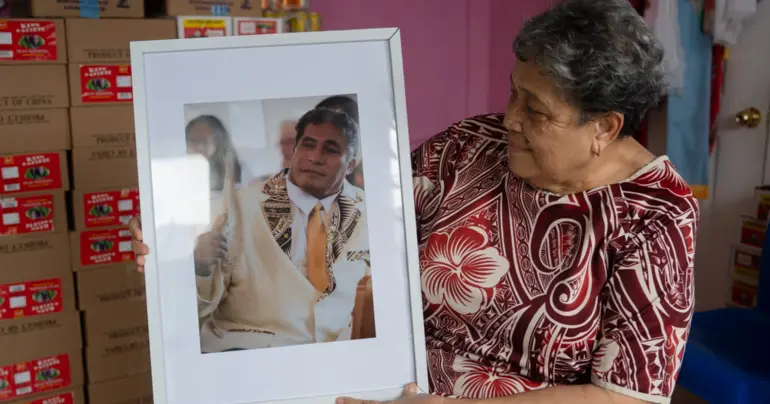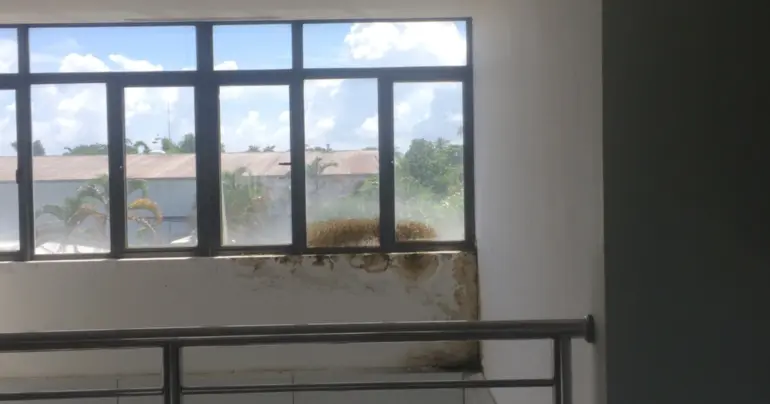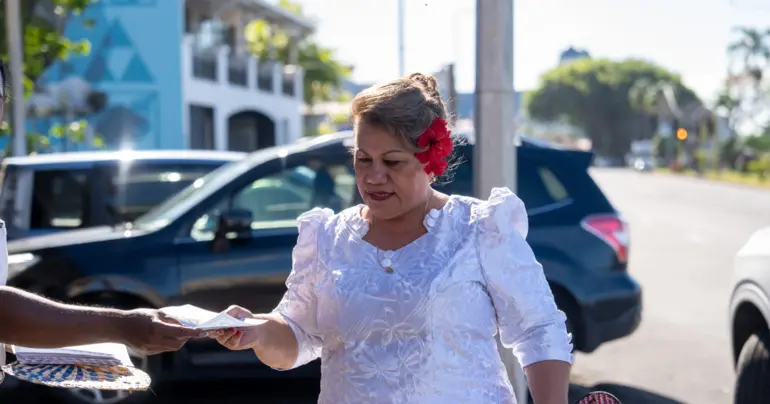Court reserves decision on lawsuit against S.R.U.
 By Matai'a Lanuola Tusani T - Ah Tong
•
13 June 2019, 9:00PM
By Matai'a Lanuola Tusani T - Ah Tong
•
13 June 2019, 9:00PM
The Supreme Court has reserved its decision on the lawsuit filed by former Manu Samoa Head Coach, Fuimaono Titimaea Tafua, against the Samoa Rugby Union (S.R.U.).
Presiding Supreme Judge, Justice Tafaoimalo Leilani Tuala – Warren, concluded the three-day trial Thursday, saying the lawyers will be informed once the decision is ready.
New Zealand-based Samoan lawyer, Satiu Simativa Perese, represented Fuimaono while Semi Leung Wai represented S.R.U.
In his closing submission, Satiu made it clear that Fuimaono was offered the position of Manu Samoa Head Coach in September 2017, which he accepted with humility.
“He said he did not know that he was not the preferred candidate until after his contract had been terminated and he learned of this through media reports,” he said.
On assuming his duties as Head Coach, Fuimaono devoted his energy, skills and expertise to the task of coaching the team to qualify for the 2019 Rugby World Cup.
The team was on the brink of not qualifying again and the final opportunity to qualify would not come around until 2018 with a two game series against a team from Europe scheduled for June – July 2018.
Between the time of Fuimaono’s appointment and the qualification games, the Manu Samoa team undertook an end of year tour to play Northern Hemisphere Tour (N.H.T.) teams and fixtures against Fiji and Tonga in the annual Pacific Rim competition.
Satiu made reference to the former Head Coach’s evidence that following the completion of the 2017 end of year N.H.T., World Rugby (W.R.) carried out a review which was favourable to the team and Fuimaono’s performance.
W.R.’s report of the review was not included in S.R.U.’s folder of exhibits for the Court’s consideration, added the lawyer.
Satiu emphasised that Fuimaono’s main goal was to qualify for the R.W.C. something that the Manu Samoa team had failed to achieve in 2015. Fuimaono was also the head coach in 2011 at the Rugby World Cup.

But things changed after a turn of events, following a “fresh from the success of qualifying” for R.W.C. 2019 in early 2018 when Fuimaono was interviewed by W.R. High Performance Annual Review.
Unlike the N.H.T. January report, Fuimaono was not privy to the outcome of the review, until after key decisions had been made concerning the contents of the report.
“Mr. Tafua said he was not aware at the time of the adverse comments which W.R. made about his elite coaching skills,” Satiu told the Court.
Fuimaono had given evidence that on Saturday 26th August 2018 at about 10 pm, he received a call from S.R.U. Chief Executive Officer, Faleomavaega Vincent Fepulea'i. He was informed of a meeting with the Chairman and other Board members the following day, Sunday 27th August 2018.
At the meeting, Fuimaono was told that his job as Head Coach was being re-advertised and was encouraged to re-apply for the position. In addition he was also told to return to work and carry on as the Head Coach, pending the outcome of the re-advertising process.
“Mr. Tafua says that had he been told that his role had been terminated and that he was no longer head coach that he would not have participated in the re-advertised process,” said Satui.
“He considered that a termination would have meant that he was not a suitable candidate because he had been dismissed.
“Mr. Tafua gave evidence that he felt hurt and humiliated by the defendant’s decision to terminate his contract. He had never been dismissed from a coaching job before and he felt the decision damaged his reputation.
“His evidence is that his professional skills are those of a rugby coach and administrator and that it was futile to look for professional coaching roles in Samoa because there are no jobs available in that field.
“Mr. Tafua says that he continues to share his knowledge and experience in voluntary capacities with local teams and players for the good of the game.”
Satiu then turned to the evidence of Faleomavaega which stated the employment was terminated because S.R.U. had the right under the contract to terminate upon giving a month notice.
He said the C.E.O. evidence stated that Fuimaono had not misconducted himself during the term of his employment.
“Mr. Tafua had not breached the terms and conditions of his employment, willfully disobeyed a lawful instruction which had been given to him by the Board or by the C.E.O, willfully misled the Union in terms of his qualifications or work experience, been absent from work without reasonable excuse for 3 consecutive days, willfully or deliberately behaved in a manner that was inconsistent with the continuation of his employment agreement.
“Mr. Tafua had not conducted himself in a manner or caused imminent or serious risk to the health or safety of another person, or the reputation, viability or profitability of the defendant’s business, committed theft, committed fraud, assaulted anyone or harassed anyone, been intoxicated at work, refused to carry out a lawful instruction and reasonable instruction that was inconsistent with his contract of employment.”
Furthermore, Satiu also pointed out that in the C.E.O. evidence he considered that it could be argued that as the Head Coach the team had not improved on their ranking.
In addition, Fuimaono had not met the Key Performance Indicator and he therefore underperformed.
The lawyer argued that the difficult with the C.E.O.’s assertion is that the K.P.I. schedule is ill defined, and open to arbitrary or niggardly assessments.
“Mr. Fepuleai’s evidence stressed the importance of funding from W.R. and the viability of the defendant’s business,” he explained.
“Further he stressed that Mr. Tafua’s selection when he was the sixth ranked candidate of seven led to W.R. alleging that the defendant had breached the terms of the W.R.’s investment policy.
“Mr. Fepuleai said that as a consequence of the breach, W.R. cancelled its funding commitments towards the salary of the head coach, and that this meant the defendant had to find Mr. Tafua’s salary from its own funds which in turn affected the defendant’s financial position.”
Also the lawyer said the C.E.Os evidence says that the Chairman, Tuilaepa Dr. Sailele Malielegaoi wrote to World Rugby explaining how Fuimaono came to be employed, rising as he did from sixth place to preferred appointment.
The letter is an exhibit dated on 30 September 2017.
Part of the letter states: “The technical panel had used 10 parameters to score the individual applicants based on the amalgamation of the ratings of the panelists.
“The weighting of these 10 parameters should have been set by the Board prior to the panelists proceeding with the assessment of the individual applicants, as the recent S.R.U. reviews had identified the importance of the Head Coach having strong leadership and father need to impose discipline and coherence amongst the players.
“These qualities should have been accorded significantly higher weighting compared to others given our recent experiences with our players. If this had been done the ratings would have been closely aligned to the consensus reached by the S.R.U. Board of the qualities which led to the appointment of Tafua.
“The panel’s report and recommendations were not taken lightly.
“Of the shortlisted candidates, the appointee (Mr. Tafua) was also noted as the most experience of the shortlisted candidates having held a National Head Coach position before, achieved Tier 1 match success and in fact led a R.W.C. campaign, with in the Board’s views, evidently exceeded W.R’s minimum standards.”
Satui added the Chairman’s letter seemed to appease World Rugby.

Also he stated the C.E.O. did not accept that he had any responsibility to ascertain from the Board what weighting’s the Board wanted to stress in order to find the type of coach that in the Board felt it needed for its team.
The Court also heard another letter penned by Peter Horne who held a position with World Rugby as the General Manager High Performance had advised S.R.U. Chief Executive Officer in the letter.
It stated: “I understand that the recent annual review, revealed that Zane Hilton is over extended combining his General Manager role with coaching support for the Head Coach, Titimaea Tafua, which is detrimentally effecting (sic) H.P. programme operations.
“Further, the need for Zane to provide coaching support has come about due to the deficiencies in the elite coaching ability of the Head Coach.
“We agree with the S.R.U. board that (1) Zane return solely to his role as General Manager H.P. (2) That a suitable replacement is sought urgently for the Head Coach position, and (3) securing high-level technical advisors for the W.R.C. 2019 campaign…”
Upon receiving the letter, the C.E.O. then spoke with the Chairman and a special meeting was called on the 25 August 2018.
In conclusion, Satiu said there is no evidence that Fuimaono caused or contributed to the termination of his contract.
“Mr. Fepuleai properly conceded that Mr. Tafua had not misconducted himself, Mr. Tafua was not a party to the defendant’s breach of the investment contract with World Rugby and nor was Mr. Tafua party to the decision to re-advertise the position of head coach.”
Also the lawyer said, S.R.U. knew of and nevertheless breached W.R.’s investment rules in appoint Fuimaono and not first discussing the appointment with W.R. to explain why he was the best candidate.
He said S.R.U. allowed W.R.’s legitimate concerns about the Union’s breach to fester to weeks, before finally the Chair “stepping away from running the country, did the C.E.O’s job and explained how the Board reached its decision and the bona rides of their assessments.
“It appears to have treated Mr. Tafua as a playing thing.
“Given the way in which the defendant had structured its finances – to front load its 2018 annual grant from World Rugby, the Board needed to backfill the second half of its operations costs, in particular the proposed 2018 N.H.T. and so it gave up Mr. Tafua in return for further World Rugby funding.
“There was no need to replace Mr. Tafua, W.R.’s report asked for solutions to the perceived skills issue.
“Instead of the defendant offering to appoint an assistant for Mr. Tafua to replace Mr. Hilton, they instead offered up Mr. Tafua.”
Fuimaono is asking S.R.U. to pay out the remaining payment of his contract $141,000 during the period that he was terminated without valid grounds.
He is not seeking any damages caused from the termination of his employment contract.
Leung Wai, on the other hand, gave a brief oral submission of the S.R.U. case providing a written copy to the Court.
The defense lawyer maintained that the Board can terminate the contract of Fuimaono and it was done for the best interest of rugby in Samoa.
He said the reality is S.R.U. depends on the financial assistance from W.R.
“If we lose that income there is no guarantee that we will get it back,” Mr. Leung Wai told the Court.
“What will happen is the downfall of S.R.U. We may have best rugby players but we need the financing and the Board is looking at the benefits of the Rugby Union of Samoa.”
He pinpointed developments done to promote woman rugby and other programmes that has allowed Samoans players to get scholarships overseas and contracts in Europe.
“There are three crucial things we need; players, God and finances,” he said.
“We have three combination then we can do it.
“The Rugby Union is trying to act in the best interest of Samoa.
“In conclusions the Labour Act does not apply and that termination was properly exercised according to the contract…”
 By Matai'a Lanuola Tusani T - Ah Tong
•
13 June 2019, 9:00PM
By Matai'a Lanuola Tusani T - Ah Tong
•
13 June 2019, 9:00PM











